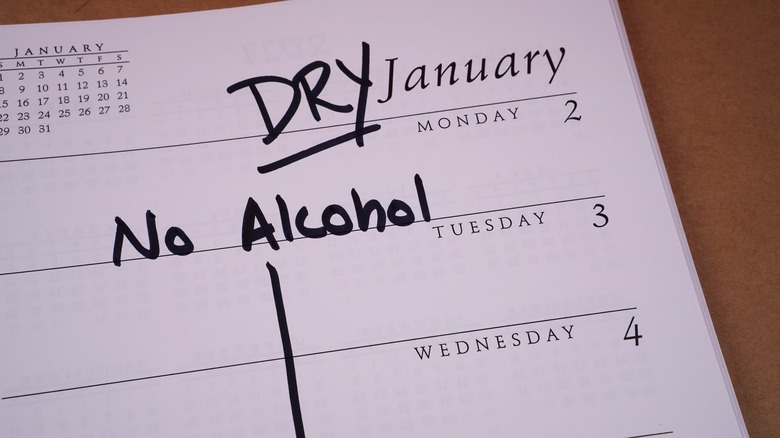How To Determine If The 'Damp Lifestyle' Is Right For You
In this day and age, you'd be hard-pressed not to encounter alcohol in your daily life. Maybe you're having dinner next to a couple toasting in celebration of their fifth anniversary at your favorite restaurant, or you turn on the television to see an advertisement of someone cracking open a cold can of beer. In our society, drinking alcohol once you reach legal age is normalized and has become part of our culture.
Have you ever wondered why people turn to alcohol consumption in the first place? As explained by Psychology Today, social expectations play a significant role in someone's drinking habits. Being invited to a location where drinking alcohol is encouraged or even expected, like a bar or party, could make it difficult to resist the temptation to drink. Some individuals may hope that drinking alcohol will increase their confidence and give them "liquid courage" in social situations.
While having a drink here and there might not cause harm to the average person, overindulging in alcohol can have severe consequences. Experts recommend drinking in moderation, which comes out to one drink or less per day for women and two drinks or less per day for men, according to the Office of Disease Prevention and Health Promotion.
The "damp lifestyle" trend was popularized by TikToker Hana Elson as an attempt to strike a balance between overdrinking and complete sobriety. If you've never heard of the term before, you might want to know if the lifestyle would work well for you.
Is the damp lifestyle right for you?
To decrease the chances of falling into the habit of excessive drinking, the damp lifestyle was introduced. Living a damp lifestyle can be done in several ways, including limiting the number of alcoholic beverages you consume or choosing alcoholic beverages with a lower alcohol content, as explained by Psychology Today.
Following a damp lifestyle may be an appropriate option for those who wish to reduce the potential side effects of drinking alcohol. Individuals who partake in the lifestyle may notice having fewer hangovers, headaches, and stomach issues after drinking. They could also experience fewer social conflicts and injuries as a result of their drinking.
The damp lifestyle can help people who want to become more conscious of their drinking habits, as mindfulness is a key component of the lifestyle (per Sunnyside). Identifying how much you drink and the reasons behind your drinking behavior requires self-reflection. "It's very important to understand why you're choosing to drink, then explore what else you can do instead to get similar results," Maria Espinola, a licensed clinical psychologist, shared with HuffPost.
Knowing whether the damp lifestyle is right for you requires an honest look at your motivations for engaging in the lifestyle, HuffPost points out. It involves asking yourself whether you struggle with alcohol dependency, as individuals without an alcohol use disorder are best suited to the damp lifestyle. If you're unsure whether you should engage in the lifestyle, you can discuss the matter with your healthcare provider.
Who might benefit from abstaining from alcohol altogether?
For those who have a complicated history with alcohol, a damp lifestyle may not be sustainable. It's important to note that everyone's relationship with alcohol is different, and some people may decide that abstaining from alcohol is the healthiest option for them.
How would someone know if complete sobriety is the best course of action for them? According to the National Institute on Alcohol Abuse and Alcoholism (NIAAA), abstaining from alcohol may be beneficial for individuals who have tried to reduce their alcohol consumption but have had difficulty controlling their drinking behavior. Individuals who struggle with an alcohol use disorder or have symptoms of the disorder may also fall into this category. If you're pregnant or on medication that can have negative interactions with alcohol, you should abstain from drinking.
Having loved ones express concern over how often you drink or your behavior while drinking is a sign that it may be time to reevaluate your relationship with alcohol, as explained by The Ranch Tennessee. Another red flag that complete abstinence may be healthier for you is if you find yourself exhibiting reckless behavior that you wouldn't have engaged in while sober. The NIAAA recommends reaching out to your primary care doctor if you're concerned about your relationship with alcohol.
If you or anyone you know is struggling with addiction issues, help is available. Visit the Substance Abuse and Mental Health Services Administration website or contact SAMHSA's National Helpline at 1-800-662-HELP (4357).



